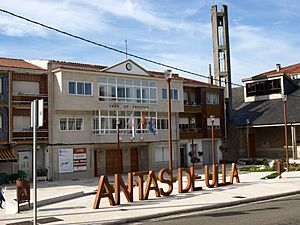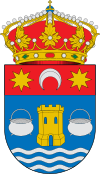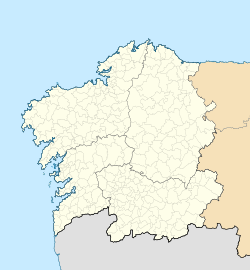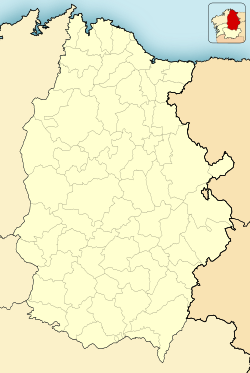Antas de Ulla facts for kids
Quick facts for kids
Antas de Ulla
|
|||
|---|---|---|---|
 |
|||
|
|||
| Country | |||
| Autonomous community | |||
| Province | Lugo | ||
| Comarca | A Ulloa | ||
| Area | |||
| • Total | 103.66 km2 (40.02 sq mi) | ||
| Elevation | 600 m (2,000 ft) | ||
| Population
(2018)
|
|||
| • Total | 2,008 | ||
| • Density | 19.371/km2 (50.171/sq mi) | ||
Antas de Ulla is a cool place in the Lugo province of Galicia, Spain. It's a municipality, which is like a local government area. This town is right where the Ulla River starts. The river also forms part of its border.
Antas de Ulla is part of a larger area called A Ulloa. This area includes the nearby towns of Monterroso and Palas de Rey.
Contents
Where is Antas de Ulla Located?
Antas de Ulla is about 45 kilometers (28 miles) from the main city of the province. You can get there easily using the LU-640 highway. This road connects Vegadeo and Pontevedra.
Natural Features of Antas de Ulla
The town has some amazing natural features. To the south, you'll find the Sierra del Monte Farelo mountains. The Ulla River also begins here and flows towards the northwest.
This special landscape means Antas de Ulla has lots of wildlife. It's a great spot for hunting and fishing. The area also gets a lot of rain, but the temperatures are usually mild. This weather helps the land stay fertile. It's perfect for growing crops and supports rich forests. You can find chestnut, oak, and Galician pine trees here.
What is the Economy Like in Antas de Ulla?
The main ways people make a living in Antas de Ulla are farming and raising animals. Many local businesses are connected to these activities. Most services, like shops and offices, are found in the main town.
The Town's Name History
Did you know the capital of Antas de Ulla used to have a different name? Until the mid-1900s, it was called Seoane. The name Antas de Ulla was already used for the whole municipality.
Fun Things to Do in Antas de Ulla
If you visit in the summer, check out the Castro de Seoane sports complex. It has different sports facilities. There are also modern swimming pools, which are perfect for kids to enjoy!
Local Market Day
Every month, on the 10th, Antas de Ulla hosts a fair or market. It's a lively event that has become very popular again in recent years. It's a great place to see local goods and meet people.
What Kind of Food Can You Find?
Antas de Ulla is famous for its delicious food!
Specialty Breads and Pies
One of the most famous things is the local bread. It's made by hand in wood ovens using wheat flour from the area. This bread is super tasty! They also make excellent pies from this bread. These pies have different fillings, like meat, cod, tuna, or liscos (bacon bits). You can choose your favorite!
Meats, Cheeses, and Produce
The meat here is also very high quality, both beef and pork. And don't forget the cheese! Many cheesemakers in Antas de Ulla are part of the "Arzúa-Ulloa" special cheese group. This means their cheese meets high standards. You'll also find fresh fruits and vegetables grown using traditional farming methods.
Festivals and Celebrations
Antas de Ulla loves to celebrate! Here are some of the main festivals:
- San Xoan (June 24)
- San Cristovo (third Sunday in July)
- Os Remedios (September 8)
Images for kids
See also
 In Spanish: Antas de Ulla para niños
In Spanish: Antas de Ulla para niños
 | Ernest Everett Just |
 | Mary Jackson |
 | Emmett Chappelle |
 | Marie Maynard Daly |









